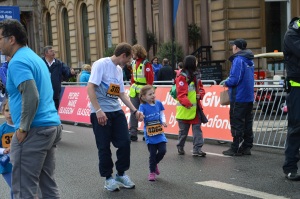I was editing a blog post. EB peered over my shoulder. “Why don’t you ever write about me?” she asked. “I do“, I said. Still, on reflection, her’s is a bit-part in this blog and yet having a sister with Rett syndrome has had a profound impact on her childhood too. We are very conscious of this and try our best to make sure that F and EB don’t feel like they only have a bit-part in our lives. Even so, I have missed countless school assemblies because I have had to be elsewhere and EB has missed parties and play dates. When they complain about this (and they do so only rarely – in fact, F almost never does), their complaints are never directed at R. I had been thinking about all of this when events unfortunately contrived to provide me with a new example.
F and EB had a gymnastics competition at the weekend. It was their first competition of the season and they were both excited. They are working with new partners and have new routines. EB, has a new, very sparkly, pink leotard (R greatly approves). So, all in all, exactly the sort of event that I really wanted and needed to attend.
Luckily, R enjoys gymnastics competitions. She enjoys the glitter. She enjoys the music. She enjoys the routines. And she genuinely loves watching F and EB compete. Every video that we have of F and EB competing has, as its soundtrack, enthusiastic and encouraging squeals from R.
As we were preparing to leave for the competition on Sunday morning, R became unwell. She was keen to go, though, so we went. But she became more and more poorly. Shortly after arriving at the venue, we decided we would have to take her home. F and EB would stay and compete. We would try to return in time for the afternoon session. They took this news well. They are pragmatic and anyway this is part of the landscape of their lives.
R didn’t have a good day. A few hours later, we found ourselves, once again, at the emergency department. G left us at the hospital and headed back to the competition. He missed their afternoon routine. F and EB didn’t complain. And while no doubt this was partly because they had both won a medal, I am sure that it was also partly because they understand that sometimes R really does need to take centre stage.



